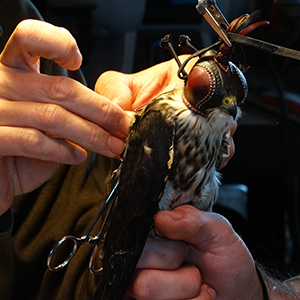Board of Directors and Advisors

Our board members and advisors augment the skills and talent we have on staff. A hallmark of BRI’s research is the care we take with the wildlife we handle, as shown here.
BRI’s Board of Directors and Advisors is comprised of members from a wide variety of disciplines. An Advisory Group provides expertise that helps facilitate our goals and mission. Our Science Council, with over 35 members, reflects the range of scientific expertise that helps build BRI’s strength in making a difference by providing information to decision makers and landscape managers.
Board of Directors
- Dr. Alex Campbell, University of New England, Biddeford, Maine – Chair
- Kate Taylor, Biodiversity Research Institute, Portland, Maine – Treasurer
- Dr. Jay Mager, Northern Ohio University, Ada, Ohio – Secretary
- Dr. David Evers, Biodiversity Research Institute, Portland, Maine – Executive Director
- Dr. James Paruk, St. Joseph’s College, Standish, Maine – Vice Chairman
Advisory Group
The standing advisory group does not have formal authority to govern the organization. Rather, the advisory group serves to make recommendations and/or provide key information and materials to the board of directors and executive director. The advisory group assists with networking and developing new initiatives. Members receive most information provided to the Board of Directors. Attendance at the quarterly board meetings is optional.
- Tom Allen – Portland, Maine
- Dr. Gerard (Jerry) Bertrand – Hamilton, MA
- Stewart Fefer, USFWS – Falmouth, Maine (Retired)
- Jim Fowler – New Canaan, CT
- Dan Hildreth – Portland, Maine
- Sherry Huber – Portland, Maine
- Dr. Tom Lovejoy, Heinz Center – Washington DC
- Dr. Larry Master – Lake Placid, New York
- Dr. Ian Newton – Huntington, England
- Dr. Robert Taylor, Texas A&M, College Station, Texas
Science Council
Council members regularly assist the organization with scientific and technical advice, reference letters for proposals and other needs, and in-kind matches for proposals. BRI provides samples, data and technical resources to Council members when requested. Often times Council members will collaborate with BRI scientists.
- Dr. Nil Basu, McGill University – Environmental health sciences
- Dr. Celia Chen, Dartmouth College – Lower foodweb ecotoxicology (freshwater and marine)
- Dr. Dan Cristol, College of William and Mary – Ornithology and ecotoxicology
- Dr. Charley Driscoll, Syracuse University – Foodweb ecotoxicology
- Dr. Collin Eagles-Smith, U.S. Geological Survey – Aquatic food webs, mercury bioaccumulation and effects to wildlife
- Dr. Tony Fox, Aarhus University – Avian impacts associated with wind power
- Dr. Peter Frederick, University of Florida – Population modeling and ecotoxicology
- Dr. Dave Gay, University of Illinois – Atmospheric sampling and lab support
- Dr. Grant Gilchrist, Environment Canada – Arctic marine bird ecology
- Dr. Stefan Hames, Cornell Lab of Ornithology – Ornithology and modeling
- Dr. Chad Hammerschmidt, Wright State University – Ecotoxicology and lab support
- Dr. Bill Hopkins, Virginia Tech University – Ecotoxicology and herpetology
- Bart Hoskins, U.S. Environmental Protection Agency – Ecotoxicology
- Dr. Patrick Jodice, Clemson University – Seabird ecology
- Neil Kamman, Vermont Dept. of Conservation – Fish toxicology and statistical support
- Dr. Adrienne Kovach, University of New Hampshire – Molecular ecology
- Dr. Rowena Langston, Royal Society for the Protection of Birds – Conservation issues with birds, especially wind power
- Dr. Chris Maher, University of Southern Maine – Mammalian social behavior and organization
- Dr. Robert Mason, University of Connecticut – Fate and transport of trace metals
- Dr. Amy McMillan, Buffalo State College – Molecular ecology
- Dr. Robert Michener, Boston University – Stable isotope interpretation and lab support
- Dr. William Montevecchi, Memorial University of Newfoundland – Ornithology, behavioral ecology, and seabird conservation
- Dr. Chris Pennuto, Buffalo State College – Aquatic ecology and ecotoxicology
- Dr. Chris Perkins, University of Connecticut – Lab support
- Dr. Mark Pokras, Tufts University – Wildlife veterinarian and ecotoxicology
- Dr. James A. Rotenberg, University of North Carolina, Wilmington – Tropical Environmental Ecology
- Dr. Joel Schmutz, USGS – Population modeling and loon conservation
- Dr. Bill Seegar, Earthspan – Raptors and satellite telemetry
- Dr. Bryan J. Sigel, Nevada State College – community ecology, conservation biology, tropical ecology, and ornithology
- Dr. Michael K. Steinberg, University of Alabama – Geo-Orthnithology, Forest Cover Changes, Endangered Species, Cultural Ecology
- Dr. Elsie Sunderland, Harvard University – Ecotoxicology (freshwater and marine)
- Harry Vogel, The Loon Preservation Committee – Loon conservation
- Dr. Jim Wiener, University of Wisconsin – Fisheries ecology and ecotoxicology
- Dr. Mark Woodrey, Mississippi State University – Estuarine avian conservation
Photo Credits: Raptor handling © BRI-Jonathan Fiely


